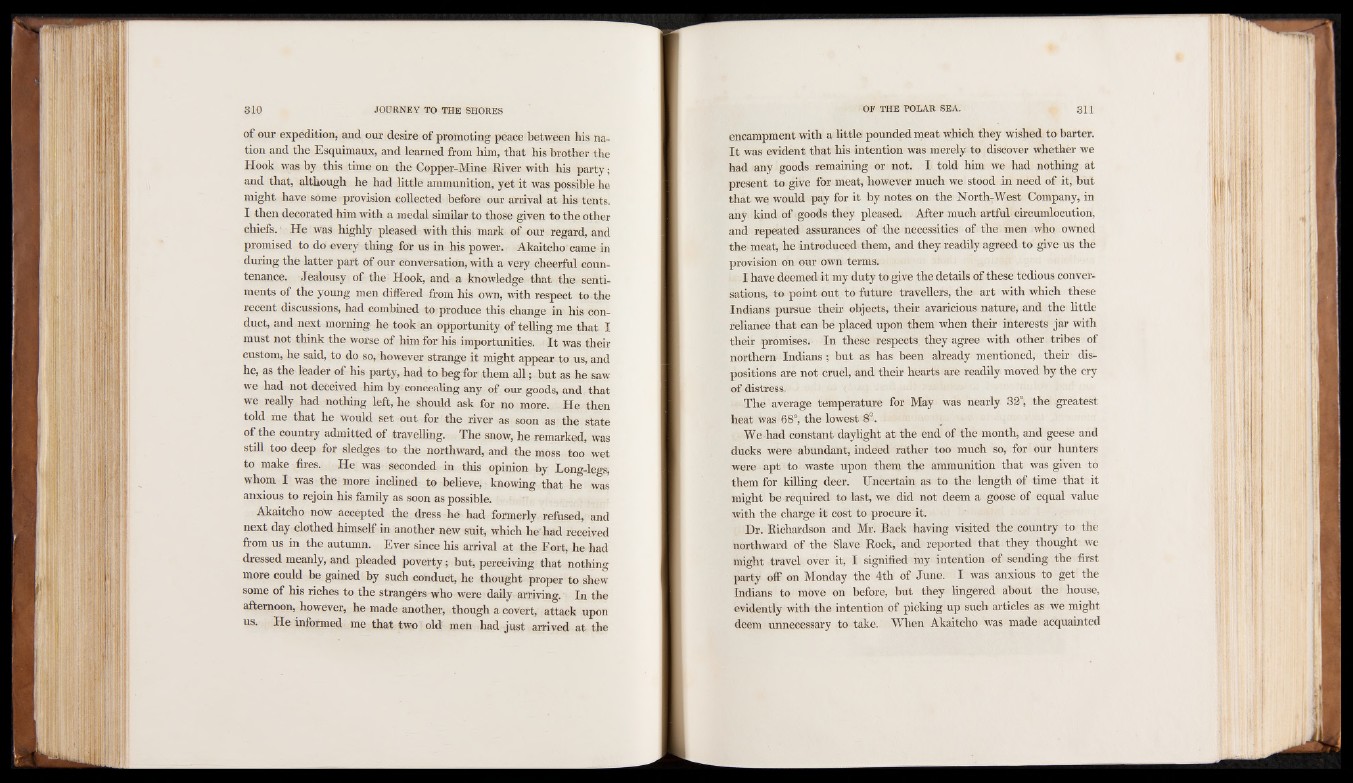
of our expedition, and our desire of promoting peace between his nation
and the Esquimaux, and learned from him, that his brother the
Hook was by this time on the Copper-Mine River with his party;
and that, although he had little ammunition, yet it was possible he
might have some provision collected before our arrival at his tents.
I then decorated him with a medal similar to those given to the other
chiefs.' He was highly pleased with this mark of our regard, and
promised to do every tiling for us in his power. Akaitcho came in
during the latter part of our conversation, with a very cheerful countenance.
Jealousy of the Hook, and a knowledge that the sentiments
of the young men differed from his own, with respect to the
recent discussions, had combined to produce this change in his conduct,
and next morning he took an opportunity of telling me that I
must not think the worse of him for his importunities. It was their
custom, he said, to do so, however strange it might appear to us, and
he, as the leader of his party, had to beg for them all; but as he saw
we had not deceived him by concealing any of our goods, and that
we really had nothing left, he should ask for no more. He then
told me that he would set out for the river as soon as the state
of the country admitted of travelling. The snow, he remarked, was
still too deep for sledges to the northward, and the moss too wet
to make fires. He was seconded in this opinion by Long-legs,
whom I was the more inclined to believe, knowing that he was
anxious to rejoin his family as soon as possible.
Akaitcho now accepted the dress he had formerly refused, and
next day clothed himself in another new suit, which he had received
from us in the autumn. Ever since his arrival at the Fort, he had
dressed meanly, and pleaded poverty; but, perceiving that nothing
more could be gained by such conduct, he thought proper to shew
some of his riches to the strangers who were daily arriving. In the
afternoon, however, he made another, though a covert, attack upon
us. He informed me that two old men had just arrived at the
encampment with a little pounded meat which they wished to barter.
It was evident that his intention was merely to discover whether we
had any goods remaining or not. I told him we had nothing at
present to give for meat, however much we stood in need of it, but
that we would pay for it by notes on the North-West Company, in
any kind of goods they pleased. After much artful circumlocution,
and repeated assurances of the necessities of the men who owned
the meat, he introduced them, and they readily agreed to give us the
provision on our own terms.
I have deemed it my duty to give the details of these tedious conversations,
to point out to future travellers, the art with which these
Indians pursue their objects, their avaricious nature, and the little
reliance that can be placed upon them when their interests jar with
their promises. In these respects they agree with other tribes of
northern Indians; but as has been already mentioned, their dispositions
are not cruel, and their hearts are readily moved by the cry
of distress.
The average temperature for May was nearly 32°, the greatest
heat was 68°, the lowest 8°.
We had constant daylight at the end of the month, and geese and
ducks were abundant, indeed rather too much so, for our hunters
were apt to waste upon them the ammunition that was given to
them for killing deer. Uncertain as to the length of time that it
might be required to last, we did not deem a goose of equal value
with the charge it cost to procure it.
Dr. Richardson and Mr. Back having visited the country to the
northward of the Slave Rock, and reported that they thought we
might travel over it, I signified my intention of sending the first
party off on Monday the 4th of June. I was anxious to get the
Indians to move on before, but they lingered about the house,
evidently with the intention of picking up such articles as we might
deem unnecessary to take. When Akaitcho was made acquainted